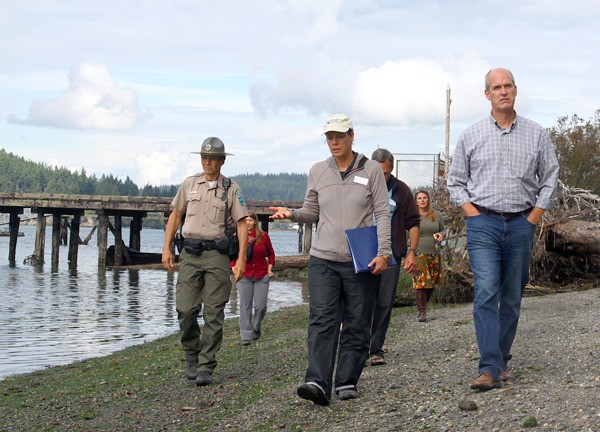Of all the trips Rick Larsen has made to Whidbey Island in 15 years as a U.S. congressman, Thursday marked a first.
Larsen, an Arlington native who represents Washington state’s Second Congressional District, had never made the turn at Cornet Bay Road before and gotten an up-close look at Cornet Bay itself.
He got that look and more Thursday, walking along a gravelly beach that is part of an ongoing shoreline restoration project aimed to help salmon populations.
He came to see the progress of a nearshore project within Deception Pass State Park that started nine years ago and involved the removal of artificial bulkheads and returning the beach to a natural slope.
The project’s primary goal is to improve spawning habitat for forage fish, which in turn, benefit the salmon that eat them.
He didn’t bring a fishing pole. “I like to fish,” he said. “I like to catch more than I like to fish.”
Cornet Bay is not only a place where hundreds of thousands of adult salmon annually pass through on their migration route to the Skagit River, it is a body of water where millions of juvenile salmon spend ample time feeding on forage fish such as smelt, herring and sand lance before venturing out to the ocean.
Larsen saw first-hand how funds from federal, state and local sources have been used to support the project, which is being managed through a partnership between the Northwest Straits Foundation, Island and Skagit Marine Resource Committees and Washington State Parks.
The U.S. Fish & Wildlife Service, the state’s Salmon Recovery Funding Board, Puget Sound Partnership and the state Department of Natural Resources provided most of the funding for the project’s first phase.
Phase two is scheduled to start this fall.
“The reason I always ask, ‘Is there federal money involved?’ is because I need to be able to go back to my colleagues in Congress who also are making decisions on what to fund and to show them that what we have funded in the past actually has ended up in the result that we expected,” Larsen said.
“Funding a coastal program, funding a national estuary program and using those dollars in a project like this, I can show my colleagues that the dollars that they’re making decisions on are actually the positive impact and the expected impact they’d want to see from the funding.”
Joan Drinkwin, interim director with the Northwest Straits Foundation, the project’s primary manager and fundraiser, led Larsen on a tour of the restored beaches.
Other foundation members came along, as did Jack Hartt, parks manager at Deception Pass.
“I’ve never seen him before,” Hartt said prior to Larsen’s arrival.
Cornet Bay was targeted by the Island County Marine Resources Committee as the site of high priority to showcase a major shoreline renovation and, in 2006, talks started with Deception Pass State Park about the feasibility of such a project in the park.
“To have him see this and appreciate it makes it a lot easier to do other similar projects,” said Lenny Corin, a member of the Island County Marine Resources Committee.
Drinkwin showed Larsen a photo of the shoreline before the creosote bulkhead was removed in the fall of 2012 and let him see for himself the progress that has been made.
A volunteer group led by the foundation’s marine biologist was on the beach, studying insects, driftwood and plant life that is part of the shoreline project’s continued monitoring effort.
“To see this pre and post and now, it’s pretty amazing,” Corin said.
“People love this. You see people on the beach. Before you never saw people on the beach.”
“It wasn’t accessible.”
Larsen made three stops on Whidbey Island Thursday. He started on the island’s south end with a visit to Whidbey Island Nourishes, an organization that provides meals for children and families dealing with hunger. He spoke and also helped make sandwiches.
“We talked about a bill I have, the Summer Meals Act of 2015,” Larsen said. “We’re trying to bring summer meals to school districts around the country rather than having those meals available during the school year.”
While on Cornet Bay Road, he also visited the Cornet Bay Company to learn more about the business that makes sauces, seasonings and other products.
The walk on the beach was a way for Larsen to learn more about local efforts to protect the environment in his home state, which are important to him.
“A lot of times, folks don’t see the benefits of salmon restoration because they want to see salmon this big,” he said with his arms stretched way out.
The hope is to someday see forage fish spawn on the restored beaches for the first time since before the bulkhead was installed in the 1970s.
“This is the first time I’ve ever been on Cornet Bay Road in 15 and a half years of serving in Congress,” Larsen said.
“I’m always looking for new places to go. And it sometimes hard to find new places to go.
“I think more importantly, this project is one product among many in the Northwest where we’re trying to restore salmon habitat both in saltwater environments and freshwater environments in order to ensure longterm health of the Puget Sound and the longterm health of salmon populations.”



